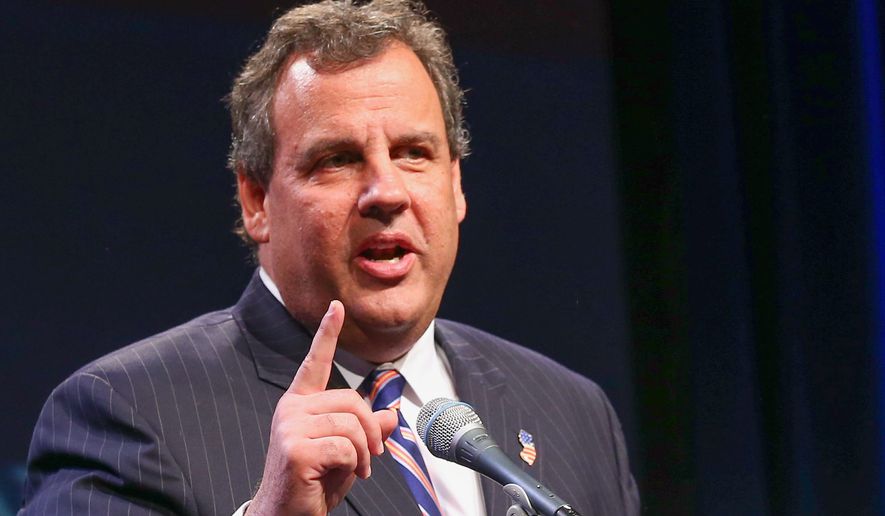A year after the Bridgegate scandal threatened to kneecap his presidential aspirations, New Jersey Gov. Chris Christie has escaped the preliminary investigations relatively unscathed and with his presidential hopes still alive, though damaged.
In a nearly two-hour-long press conference last January, the Republican governor apologized for his aides’ decision to close lanes on the George Washington Bridge, beginning a trying time for Mr. Christie.
The fallout has left him dented as a political candidate, with his favorability rating down 20 percentage points. He now polls as another also-ran among others in the 2016 GOP presidential race, and trails former Secretary of State Hillary Rodham Clinton in a potential general election matchup even in his home state.
Yet neither Mr. Christie’s own commissioned probe nor a special investigative committee led by Democrats in the state Legislature has unearthed evidence linking the governor to the order that closed the toll lanes, snarling traffic and leading to charges that his administration was trying to punish his political enemies.
The 136-page report from the Democrat-led legislative committee left open the possibility that Mr. Christie could have been involved and said it’s unclear when he learned of the closures, but it added that no evidence links the governor to the move by his top political aides.
Investigators said they couldn’t reach a definitive conclusion because some witnesses refused to talk.
“At present, there is no conclusive evidence as to whether Governor Chris Christie was or was not aware of the lane closures either in advance of their implementation or contemporaneously as they were occurring,” the report said. “Nor is there conclusive evidence as to whether Governor Christie did or did not have involvement in implementing or directing the lane closures.”
Still, the fact that a Democratic panel said as little as it did led Christie allies to claim exoneration.
“I’m not surprised that this committee found nothing to contradict the governor’s statements of nearly a year ago despite its blatant partisan bias,” Bill Palatucci, a close Christie confidante and member of the Republican National Committee from New Jersey, told The Washington Times after the report was released.
The political damage, however, is told by the polling numbers.
“The dip primarily came immediately after the Bridgegate press conference in January. Since then, his numbers have trended in a very narrow band,” said David P. Redlawsk, director of the Eagleton Institute of Politics at Rutgers University, which has polled on the governor. “There is no doubt at all that Bridgegate eliminated the yearlong [Superstorm] Sandy bounce Christie had enjoyed.
“However, what we do not know for sure is if the continued much lower ratings are because people are still thinking about Bridgegate or are simply the return to where he was before Sandy,” he said. “His numbers now are slightly worse than pre-Sandy, but not a lot.”
Mr. Christie’s political future got more clouded this month when former Florida Gov. Jeb Bush announced he was exploring a run for the White House. Political analysts said that could force Mr. Christie to announce his own presidential plans earlier than he wanted.
One analyst said it also signaled a desire by moderate Republican donors for an alternative to Mr. Christie.
“I definitely think there is suspicion among voters, and he is not the candidate he was before that,” said Neil Levesque, executive director of the New Hampshire Institute of Politics at St. Anselm College. “That may be one reason why a lot of these money people have gone to Jeb Bush and said, ’We want you to get into this race.’”
Mr. Christie also had to shake up his political team in the wake of the bridge scandal.
He fired Deputy Chief of Staff Bridget Anne Kelly and withdrew his nomination of Bill Stepien, his 2013 campaign manager, to be chairman of New Jersey’s Republican Party. He also canceled any business Mr. Stepien had with the Republican Governors Association, of which Mr. Christie is chairman.
Republicans applauded Mr. Christie’s response, saying he accepted responsibility and moved to fix the problem.
Democrats, meanwhile, painted Mr. Christie as a bully and blamed him for creating a culture in which such actions seemed OK to his subordinates.
It also made him an easier target for conservatives, many of whom had questioned his commitment to their causes, including traditional marriage, repealing Obamacare and fighting illegal immigration.
National polls show Mr. Christie running third among potential Republican presidential contenders, behind Mr. Bush and Rep. Paul Ryan of Wisconsin, and just ahead of Sen. Rand Paul of Kentucky, former Arkansas Gov. Mike Huckabee and retired neurosurgeon Ben Carson.
He is running in the middle of the pack in Iowa, which traditionally begins the nomination process with caucuses, and second in New Hampshire, stop two on the nomination calendar.
• Seth McLaughlin can be reached at smclaughlin@washingtontimes.com.




Please read our comment policy before commenting.